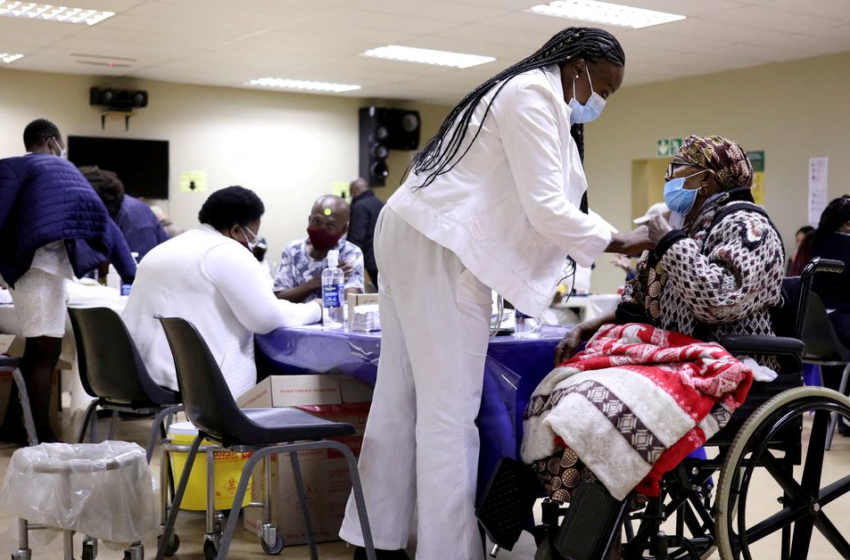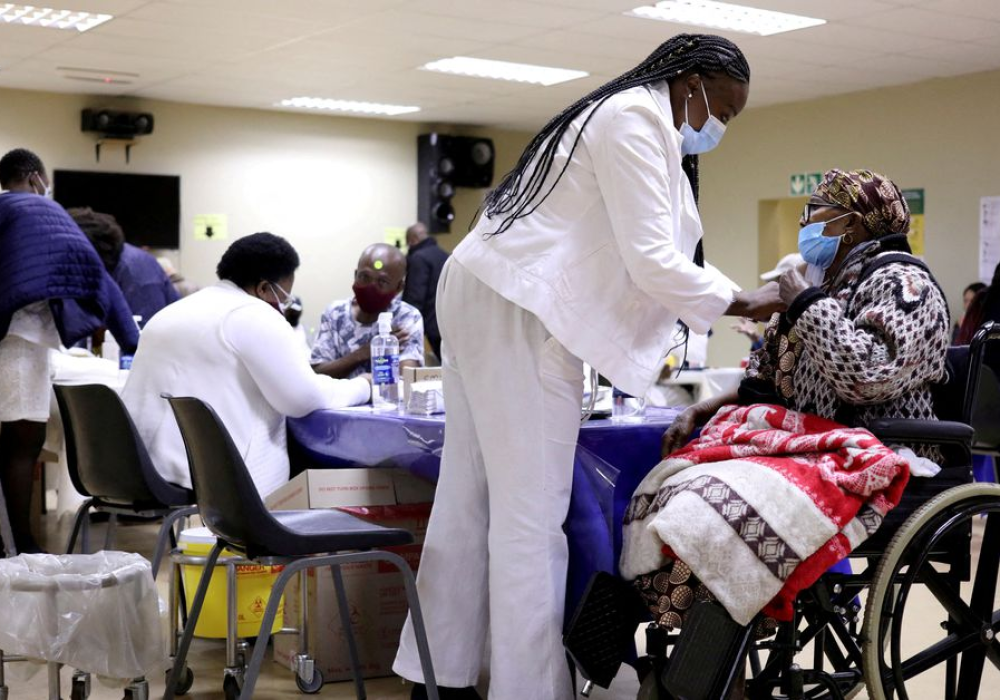A woman receives a dose of a coronavirus disease (COVID-19) vaccine, as South Africa rolls out the coronavirus disease (COVID-19) vaccination to the elderly at the Munsieville Care for the Aged Centre outside Johannesburg, South Africa May 17, 2021. REUTERS/Siphiwe Sibeko
Register now for FREE unlimited access to Reuters.com
Register
Jan 7 (Reuters) – The following is a summary of some recent studies on COVID-19. They include research that warrants further study to corroborate the findings and that has yet to be certified by peer review.
South African hospital sees less serious disease with Omicron
Doctors in one of the cities where Omicron was first identified say the surge driven by the new variant has been marked by less serious disease than earlier waves of the pandemic and there are clear signs that case and hospital admission rates may decline over the next few weeks.
Register now for FREE unlimited access to Reuters.com
Register
At the Steve Biko Academic Hospital in the City of Tshwane, doctors compared 466 infected patients admitted since mid-November 2021 to 3,976 patients admitted before then. The mortality rate during the Omicron surge was 4.5%, compared to 21.3% in the earlier period, they reported in the International Journal of Infectious Diseases. Omicron patients were discharged after an average of 4 days, compared to 8.8 days for patients with earlier variants. At the peak of the Omicron surge, the number of beds filled with infected patients was half of that in the earlier period, and 63% of Omicron patients were hospitalized for other reasons, with the virus only detected by mandatory tests.
“The Omicron outbreak has spread and declined… with unprecedented speed, peaking within four weeks,” the researchers said. They noted that outcomes may vary in countries with different population characteristics and levels of immunity from infection and vaccination. But if the pattern seen in South Africa “continues and is repeated globally … Omicron may be a harbinger of the end of the epidemic phase” of the health crisis.
Unique strings of molecules may predict variants’ success
Researchers believe they have discovered an important way to identify SARS-CoV-2 variants that are likely to spread.
Looking at 9-unit strings of molecules called nucleotides – the building blocks of genes – they found that except for Beta, which did not circulate widely outside of South Africa, each new variant has had more unique strings than the variant that immediately preceded it. The original, or wild, version of the virus had 45 unique so-called 9-mers, the researchers reported on Thursday on medRxiv ahead of peer review. Alpha had 109 unique 9-mers, Beta 69, Gamma 122 and Delta 181. The currently dominant Omicron variant has 295.
Many of these stretches of altered polynucleotides have nothing to do with the spike the virus uses to break into cells, which suggests researchers should not focus only on the spike protein, said Venky Soundararajan of Massachusetts-based data analytics company nference. The spike is the target of most current COVID-19 vaccines and antibody treatments.
Soundararajan said a variant circulating in France, called IHU, has more distinct 9-mers than Delta but has been unable to out-compete Omicron. Because IHU has not circulated widely outside of France, he said, populations have not acquired immunity to it, and variants that have yet to emerge in other places may find it “useful” to develop some of the same 9-mer mutations. Vaccine manufacturers should pay attention to IHU’s unique nucleotide signatures because there is a good chance they will show up again in future variants, Soundararajan said.
Click for a Reuters graphic on vaccines in development.
Register now for FREE unlimited access to Reuters.com
Register
Reporting by Nancy Lapid; Editing by Bill Berkrot
Our Standards: The Thomson Reuters Trust Principles.










